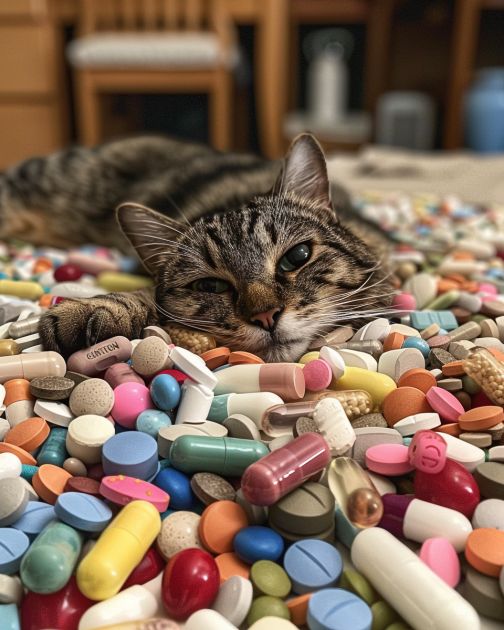Vitamins and supplements can be a beneficial addition to a diet for both humans and pets, offering a variety of health benefits and making up for any nutritional deficiencies. However, striking the right balance is crucial as over-supplementation can have adverse effects.
When it comes to our feline friends, their dietary needs are vastly different from our own, and the practice of giving a cat vitamins must be approached with caution and understanding.
Advertisement
Understanding Feline Nutritional Needs
Cats are obligate carnivores and require a different nutritional balance than humans. Their bodies need a range of specific nutrients that are found naturally in their prey in the wild. This includes a high protein diet, certain amino acids like taurine, vitamins, minerals, fatty acids, and water.
When domesticated cats are provided with commercially prepared food, reputable brands ensure that these dietary requirements are met. Most vet-recommended cat foods are formulated to be complete and balanced for a cat's particular life stage and health status. Therefore, extra vitamins are often unnecessary and can sometimes even lead to toxicity.
The Risk of Over-Supplementation
While your mother-in-law's intentions are likely based on love and concern for the cat's wellbeing, the practice of giving a cat several vitamins a day can be harmful. Here are a few reasons why:
1. Cats can suffer from hypervitaminosis, which is vitamin poisoning due to excessive intake.
2. Certain vitamins, such as A and D, are fat-soluble, meaning they are not easily excreted from the body and can accumulate to toxic levels.
3. Excessive minerals can interfere with the absorption of other necessary nutrients, potentially leading to imbalances and health problems.
4. Some human vitamins may contain ingredients that are toxic to cats, such as artificial sweeteners like xylitol.
2. Certain vitamins, such as A and D, are fat-soluble, meaning they are not easily excreted from the body and can accumulate to toxic levels.
3. Excessive minerals can interfere with the absorption of other necessary nutrients, potentially leading to imbalances and health problems.
4. Some human vitamins may contain ingredients that are toxic to cats, such as artificial sweeteners like xylitol.
Consulting a Veterinarian
Before any supplements are added to your cat's diet, it is imperative to consult with a veterinarian. A professional can offer guidance based on the specific health needs of your pet, taking into account age, health status, and any medical conditions.
Your vet can perform a nutritional assessment to determine if your cat is lacking any nutrients in their current diet. In cases where supplementation is necessary, your vet will provide appropriate dosage and recommend pet-specific vitamins designed to be safe and effective for cats.
Effective Communication with Your Mother-in-Law
In situations where family members have differing opinions on pet care, having an open and understanding dialogue is critical. Here are some strategies to address the issue:
1. Share information: Provide your mother-in-law with articles and information from credible sources highlighting the risks of over-supplementing.
2. Involve the vet: Encourage her to join you on a visit to the veterinarian to discuss the cat's health and nutritional needs.
3. Offer alternatives: Suggest other ways she can contribute to the cat's wellbeing, such as engaging in play, grooming, or investing in high-quality cat food.
2. Involve the vet: Encourage her to join you on a visit to the veterinarian to discuss the cat's health and nutritional needs.
3. Offer alternatives: Suggest other ways she can contribute to the cat's wellbeing, such as engaging in play, grooming, or investing in high-quality cat food.
Advertisement
Your cat's health should always be the top priority. While people often project their own health routines onto their pets, it's essential to recognize and respect the physiological differences between species. If your mother-in-law is concerned about the cat's health, the best approach is to work together with a veterinarian to ensure that the pet's dietary needs are adequately met without the risk of over-supplementation.

